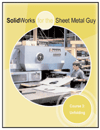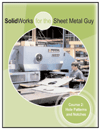Lowering expenses and overhead is essential in this highly competitive market. By decreasing how much you spend, you're able to offer better prices to increase your business. Beyond that, if you can lower energy consumption, you'll be doing your part to address climate change.
That’s just what Beltsville, Maryland-based Stromberg Metal Works, Inc., is doing.
"Stromberg believes in trying to do our part in energy saving even if we are only a small part of the big picture," says Michael Gawne, General Manager at Stromberg Metal Works, Inc.'s Specialty and Architectural Division.
Getting other sheet metal shops to do their part is essential in addressing climate change.
"Stromberg has taken steps to be more efficient by making our employees more aware of trying to eliminate the usage of lights, equipment, heating, and AC during non-working hours," says Mike Tabor, Regional Executive Operations at Stromberg Metal Works, Inc. "As a manufacturing shop, we sometimes have equipment that needs to be updated or replaced. When this occurs, we take the time to look into purchasing the most efficient equipment we can that fits within our budget."
Energy-efficient upgrades have a longer life span, which reduces the cost of maintenance and repairs, as well.
Not sure what changes and upgrades you can make in your own sheet metal shop to do your part? Here, Gawne and Tabor offer advice.
Fixing energy flaws
It's easy to overlook some common energy mistakes, such as leaving large manufacturing equipment running idle.
"Depending on what is running through the shop day-to-day, there are times when a piece of equipment is being used for only part of the fabrication cycle but is left running idle for several hours," Tabor says.
Pair that idle equipment with leaving lights on unnecessarily and you're burning through energy without even realizing it. To be more energy efficient, Tabor suggests replacing all lighting with LED motion detectors. This way, you eliminate any unnecessary usage throughout the day.
"Replacing all HVAC thermostats with energy rebate versions and swapping older equipment with new energy-efficient models are two additional ways to increase energy efficiency," Tabor notes.
Partner with an Energy Savings Company (ESCO) or call your local utility provider to ask about upgrades and savings that are offered.
"Many will help to align rebates and programs that fit your company, with some offering custom rebates that can be tailored for many different applications," Gawne says. "Companies can apply the savings cost to their budget for purchasing this equipment, possibly allowing for the purchase of a better, more efficient model."
In the HVAC/sheet metal industry, efficiency on the shop floor is essential for businesses to maintain productivity while being able to remain competitive in today’s market. Simple changes such as replacing old equipment, educating your team on best practices, and researching rebate programs improve overall efficiency while contributing to overall sustainability.










